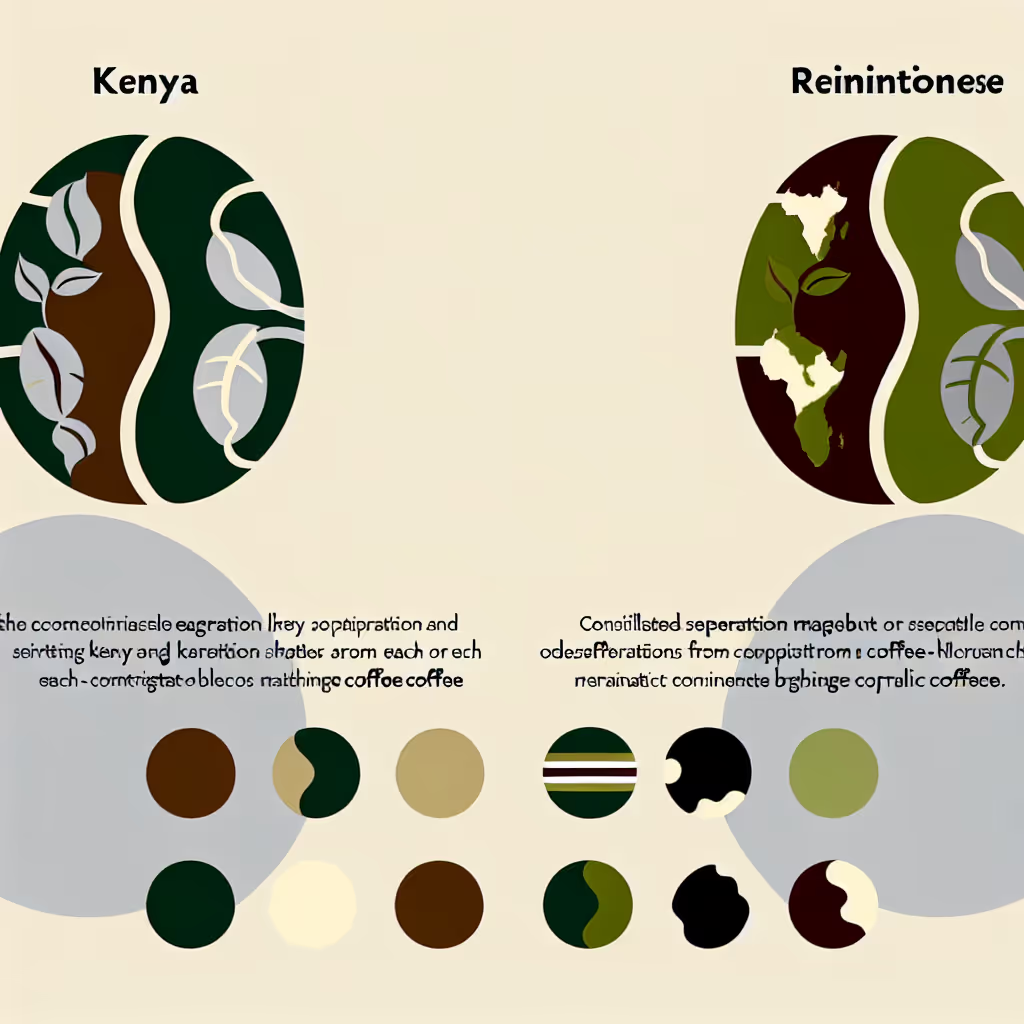Kenyan Vs. Ghanaian Coffee
This comparison explores the distinct qualities of Kenyan and Ghanaian coffee, highlighting their flavor profiles, growing conditions, and brewing methods. Ideal for coffee enthusiasts seeking to understand African bean origins.

Brief Description
Kenyan coffee is renowned for its bright acidity, full body, and complex flavor profile. Grown in the rich volcanic soils of the Central Highlands, these beans benefit from ideal climate conditions and meticulous processing. The result is a cup that's bold, wine-like, and often described as the 'connoisseur's choice'. With notes ranging from blackcurrant to citrus, Kenyan coffee offers a truly unique and memorable tasting experience.
Ghanaian coffee, primarily Robusta, is known for its bold, earthy flavors and full body. Grown in the lush Volta Region, these beans thrive in the tropical climate and rich volcanic soils. While not as internationally recognized as some African coffees, Ghanaian beans are gaining popularity for their unique profile and potential in specialty blends. The country's coffee industry is small but growing, with efforts to increase production and quality.
Importance of Comparison
Comparing Kenyan and Ghanaian coffee is crucial for coffee lovers looking to explore diverse African origins. These two countries represent different coffee traditions and flavor profiles, offering unique insights into the continent's coffee production. Understanding their differences helps consumers make informed choices and appreciate the variety within African coffees.
Key Attributes
Origin
Kenyan
Ghanaian


Consumer Guide
When choosing between Kenyan and Ghanaian coffee, consider your flavor preferences. Kenyan coffee offers a bright, complex profile with notes of blackcurrant and citrus, ideal for those who enjoy a vibrant, wine-like cup. It excels in pour-over and French press brewing. Ghanaian coffee, primarily Robusta, provides a bold, earthy flavor with chocolate notes, perfect for espresso and cold brew. Consider the altitude difference: Kenyan beans grow at 1400-2100m, while Ghanaian beans thrive at 300-800m, affecting their flavor complexity. Kenyan coffee's larger production (50,000 metric tons annually) means wider availability compared to Ghana's 850 metric tons. For a unique experience, try both in a side-by-side tasting to appreciate their distinct characteristics.
Expert Opinions
Coffee expert Maria Rodriguez notes, 'Kenyan coffee is often considered the pinnacle of African production, known for its bright acidity and complex flavors. Ghanaian coffee, while less recognized, offers a unique robustness that's gaining appreciation in specialty blends.' Roaster John Smith adds, 'The double fermentation process used in Kenya contributes to its distinctive profile, while Ghana's natural processing enhances its earthy notes. Both origins showcase the diversity of African coffee.'
FAQs
Kenyan coffee is known for its bright acidity, full body, and complex flavor profile with notes of blackcurrant, citrus, and floral undertones. Ghanaian coffee, primarily Robusta, offers bold, earthy flavors with nutty and chocolate notes. Kenyan coffee is often described as wine-like, while Ghanaian coffee is more robust and full-bodied.
Kenyan coffee is typically grown in the Central Highlands at altitudes of 1400-2100m in rich volcanic soils. This high altitude contributes to its complex flavor profile. Ghanaian coffee is grown in the Volta Region at lower altitudes of 300-800m in a tropical climate. The difference in altitude and climate significantly impacts the flavor development and characteristics of the beans.
For Kenyan coffee, pour-over, French press, and cold brew methods are recommended to highlight its complex flavors and bright acidity. Ghanaian coffee, with its bold and earthy profile, is well-suited for French press, espresso, and cold brew methods. These brewing techniques help to accentuate the unique characteristics of each origin.
Kenya has a significantly larger coffee production, with an annual output of about 50,000 metric tons. In contrast, Ghana's coffee production is much smaller, at around 850 metric tons annually. This difference in production volume affects the availability and global recognition of these coffees in the international market.
Kenyan coffee is typically processed using washed methods, including double fermentation, followed by sun-drying. This contributes to its clean, bright flavor profile. Ghanaian coffee is processed using natural, washed, and semi-washed methods. The natural processing, in particular, enhances the earthy and full-bodied characteristics of Ghanaian coffee.
Both origins offer unique experiences for specialty coffee enthusiasts. Kenyan coffee is often favored by connoisseurs for its complex, bright profile and is widely recognized in the specialty coffee world. Ghanaian coffee, while less known, is gaining popularity in specialty blends for its unique robustness. Enthusiasts interested in exploring diverse African flavors would benefit from trying both to appreciate their distinct qualities.
Conclusion
Kenyan and Ghanaian coffees offer distinct experiences for coffee lovers. Kenyan beans, with their bright acidity and complex flavors, are ideal for those seeking a vibrant, wine-like cup. Ghanaian coffee provides a bold, earthy alternative, perfect for espresso and cold brew enthusiasts. While Kenya's coffee industry is more established, Ghana's growing sector offers exciting potential. For a comprehensive African coffee experience, we recommend trying both origins. Kenyan coffee shines in pour-over brewing, while Ghanaian beans excel in French press. Ultimately, your choice depends on personal taste preferences and desired brewing method.






